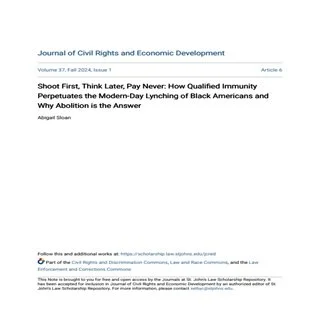Shoot First, Think Later, Pay Never: How Qualified Immunity Perpetuates the Modern-day Lynching of Black Americans and Why Abolition Is the Answer
By Abigail Sloan
Luke Stewart was twenty-three years old when he was killed for being a Black man asleep in his car. Luke was legally parked near a friend’s house in the Cleveland suburbs when two men woke him by knocking on his window. One of the men opened the door to Luke’s car and attempted to forcibly remove him by his head; the second man leaped into Luke’s car and began attacking him. Out of fear, Luke attempted to drive away, but within about one minute, the second man punched Luke, stunned him with a taser six times, and then struck him in the head before shooting him five times, killing him. The two attackers were police officers who never identified themselves to Luke––who was unarmed and did not pose a threat to them. As if Luke’s killing is not tragic enough, when a civil rights lawsuit was filed in response to his death, it was dismissed because of the doctrine of qualified immunity. The Sixth Circuit Court of Appeals held that even though a jury could find that the officer’s decision to shoot Luke had violated his constitutional rights, and that “the use of deadly force was unreasonable,” the officer could not be held liable. Qualified immunity holds officers liable only in situations where they have violated someone’s clearly established rights, and because a case with these exact facts has never been considered in court, the right for Luke to not be killed while asleep in his car had not been “clearly established.” The police department did not discipline the officer for his actions, and he was completely shielded from civil liability. Luke’s mother, who filed the lawsuit on his behalf, attempted to appeal the Sixth Circuit’s decision to the Supreme Court, but the Court declined to take the case, meaning Luke and his family will never see justice. Police officers’ use of deadly and excessive force leads to the violent, public, and horrific killing of thousands of Black men, women, and children––Luke’s story is far from unique. The reality is that Luke became yet another victim of a violent and oppressive American regime that has failed to rectify hundreds of years of calculated attacks on Black lives—Luke was lynched. Today’s perpetrators are not the same masses of self-appointed vigilantes, but rather they are police officers who hide behind their badges and the ever-powerful blanket of qualified immunity. Lynchings no longer resemble mobs hanging Black men and women from trees, but they continue to remain a violent act of terror against Black Americans.
37 Journal of Civil Rights & Economic Development 49 (Fall, 2024)


